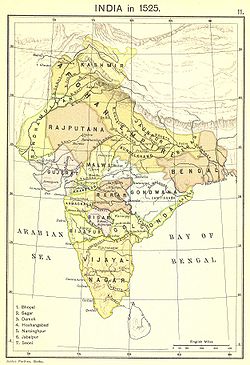Malwa Sultanate
| Malwa Sultanate | ||||||||||
|
||||||||||
|
Malwa Sultanate in the 15th century.
|
||||||||||
| Capital | Dhar; later Mandu | |||||||||
| Religion | Islam | |||||||||
| Government | Sultanate | |||||||||
| History | ||||||||||
| • | Established | 1392 | ||||||||
| • | Disestablished | 1562 | ||||||||
|
||||||||||
| Today part of |
|
|||||||||
The Malwa Sultanate was a late medieval kingdom presumably of Turco-Afghan origin, in the Malwa region of the present day Madhya Pradesh state in India in 1392–1562.
For the region's earlier history, see article Malwa.
The sultanate of Malwa was founded by Dilawar Khan Ghuri, the governor of the Delhi Sultanate in Malwa, who asserted his independence in 1392, but did not actually assume the ensigns of royalty till 1401. Initially Dhar was the capital of the new kingdom, but soon it was shifted to Mandu, which was renamed Shadiabad (the city of joy). After his death, he was succeeded by his son Alp Khan, who assumed the title of Hoshang Shah. The Ghurid dynasty, founded by Dilawar Khan Ghuri, was replaced by Mahmud Shah I, who proclaimed himself king on May 16, 1436. The Khilji dynasty, founded by him, ruled over Malwa till 1531. Mahmud I was succeeded by his eldest son Ghiyas-ud-Din. The last days of Ghiyas-ud-Din was embittered by a struggle for throne between his two sons, Nasir-ud-Din and Ala-ud-Din. Nasir-ud-Din, however emerged victorious and ascended the throne on October 22, 1500. The last ruler Mahmud Shah II surrendered to Bahadur Shah, the sultan of Gujarat after the fort of Mandu fell to Bahadur on May 25, 1531.
During 1531 – 1537 the kingdom was under the control of Bahadur Shah, though the Mughal padshah (emperor) Humayun captured it for a short period during 1535-36. In 1537, Qadir Shah, an ex-officer of the previous Khilji dynasty rulers, regained control over a part of the erstwhile kingdom. But in 1542, Sher Shah Suri conquered the kingdom, defeating him and appointed Shuja'at Khan as the governor. His son, Baz Bahadur, declared himself independent in 1555. In 1561, Akbar the Great's Mughal army, led by Adham Khan and Pir Muhammad Khan, attacked Malwa and defeated Baz Bahadur in the battle of Sarangpur on 29 March, 1561. Akbar soon recalled Adham Khan and made over command to Pir Muhammad. Pir Muhammad attacked Khandesh and proceeded up to Burhanpur, but he was defeated by a coalition of three powers: Miran Mubarak Shah II of Khandesh, Tufal Khan of Berar Sultanate and Baz Bahadur. Pir Muhammad died while retreating. The confederate army pursued the Mughals and drove them out of Malwa. Baz Bahadur regained his kingdom for a short period. In 1562, Akbar sent another army, led by Abdullah Khan, an Uzbeg, which finally defeated Baz Bahadur. He fled to Chittor. It became the Malwa Subah (top-level province) of the Mughal empire, with seat at Ujjain and Abdullah Khan became its first governor.
...
Wikipedia

